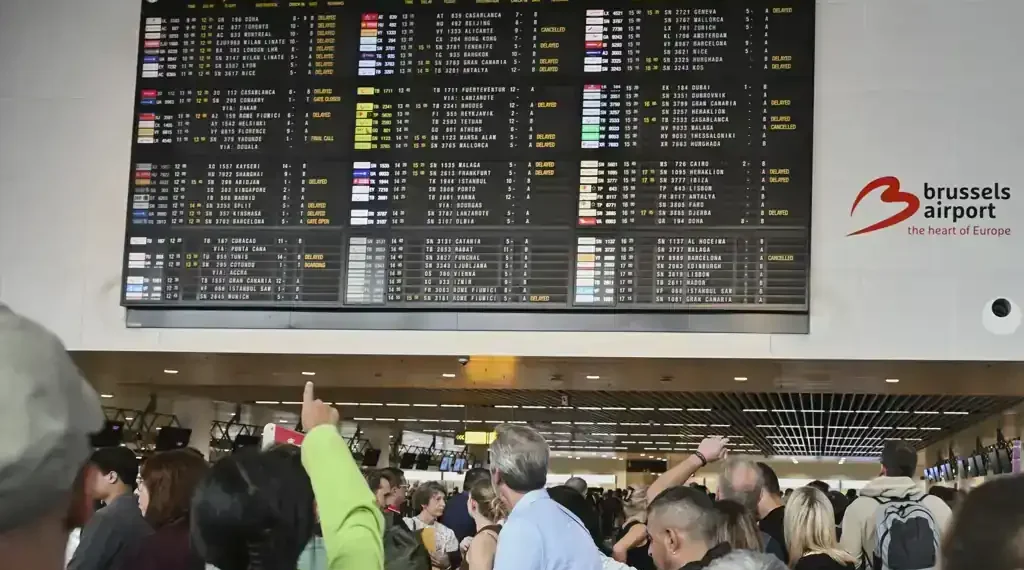Cyberattack Causes Temporary Disruptions at Key European Airports
Published Time: 09-20-2025, 08:00 EDT
A cyberattack targeting check-in and boarding systems at several major European airports caused temporary disruptions on Saturday. While the impact was initially concerning, officials reported that most operations were restored quickly, with limited flight cancellations. Brussels, Berlin, and London airports were among the sites affected, although other airports across Europe reported normal operations.
Scope of the Cyberattack
Officials confirmed that the incident primarily involved a third-party service provider responsible for electronic check-in and boarding systems, rather than airlines or the airports themselves.
Brussels Airport issued a statement noting, “There was a cyberattack on Friday night, 19 September, against the service provider for check-in and boarding systems affecting several European airports, including Brussels Airport.” The airport initially described a “large impact” on flight schedules but emphasized that manual check-in procedures remained available for passengers.
The disruption affected self-service check-in kiosks, electronic boarding, and baggage tagging systems. Collins Aerospace, the technology company providing the MUSE (Multi-User System Environment) software, acknowledged a “cyber-related disruption” at select airports and said it was actively working to restore services.
Impact on European Airports
Brussels Airport:
By mid-morning Saturday, Brussels Airport reported nine flight cancellations, four flights redirected to alternative airports, and 15 delays exceeding one hour. Airport spokesperson Ihsane Chioua Lekhli told broadcaster VTM that the duration of the disruption was still unclear, emphasizing that manual check-in and baggage drop operations helped mitigate the impact.
Berlin Brandenburg Airport:
Axel Schmidt, communications head at Brandenburg Airport, stated that as of late morning, “we don’t have any flights canceled due to this specific reason, but that could change.” The airport had temporarily disconnected affected systems to prevent further complications.
London Heathrow Airport:
Heathrow, Europe’s busiest airport, reported minimal disruption. A spokesperson confirmed that no flight cancellations were directly attributed to the incident, though some delays may have occurred. Heathrow officials advised passengers to monitor flight status updates before traveling.
Response from Collins Aerospace
Collins Aerospace, a subsidiary of RTX Corp., described the incident as a “cyber-related disruption” affecting MUSE software, which supports check-in, boarding, and baggage management operations.
In a company statement, Collins confirmed:
“The impact is limited to electronic customer check-in and baggage drop and can be mitigated with manual check-in operations. We are actively working to resolve the issue and restore full functionality to our customers as quickly as possible.”
The company did not provide a precise timeline for full system restoration but assured airports and passengers that operations were being monitored closely to minimize further impact.
Travel Advisory and Passenger Guidance
Airports affected by the cyberattack urged travelers to:
- Check flight status online or via airline apps before arriving at the airport.
- Allow extra time for manual check-in and security procedures.
- Stay informed through official airport channels for updates on delays or cancellations.
Despite the disruptions, airport authorities emphasized that safety and operational continuity were maintained. Passengers experienced minor inconveniences, but essential air traffic and boarding procedures continued under manual supervision.
Broader Implications for Aviation Cybersecurity
This incident highlights the growing importance of cybersecurity in the aviation industry. As airports increasingly rely on digital systems for passenger processing, any disruption to third-party service providers can cascade into operational delays and passenger inconvenience.
Experts warn that the aviation sector remains a potential target for cyberattacks due to the reliance on interconnected software systems, ranging from check-in kiosks to baggage handling and air traffic coordination. Strengthening cybersecurity protocols and contingency plans is becoming essential for minimizing disruptions and ensuring passenger safety.
Conclusion
While the cyberattack on Collins Aerospace systems temporarily affected major European airports, its overall impact remained limited due to swift mitigation measures and manual procedures. Brussels, Berlin, and London airports experienced minor flight disruptions, while other European airports operated normally.
Authorities and technology providers continue to work collaboratively to restore full electronic functionality, emphasizing the importance of resilience against future cyber threats in global aviation.
This article was rewritten by JournosNews.com based on verified reporting from trusted sources. The content has been independently reviewed, fact-checked, and edited for accuracy, neutrality, tone, and global readability in accordance with Google News and AdSense standards.
All opinions, quotes, or statements from contributors, experts, or sourced organizations do not necessarily reflect the views of JournosNews.com. JournosNews.com maintains full editorial independence from any external funders, sponsors, or organizations.
Stay informed with JournosNews.com — your trusted source for verified global reporting and in-depth analysis. Follow us on Google News, BlueSky, and X for real-time updates.














